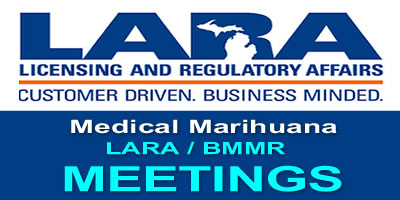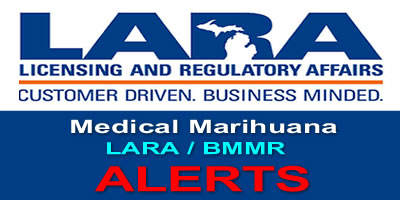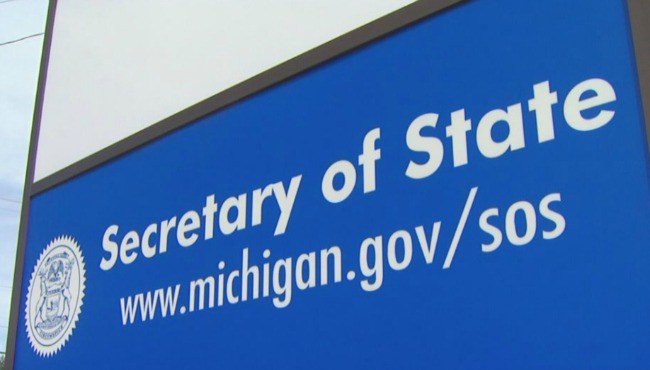


LARA MMMA Public Meeting 5-4-18
Medical Marihuana Review Panel
May 4, 2018 – 9:00 a.m.
Location:
Williams Building 1st Floor Auditorium
525 W Ottawa St, Lansing, MI 48933
AGENDA
The public hearing is for the Medical Marihuana Review Panel (Review Panel) to review
petitions to include a particular medical condition or treatment to the list of debilitating
medical conditions pursuant to the Michigan Medical Marihuana Act, 2008 IL 1, MCL
333.26421 to 333.26430 (MMMA).
The petitions submitted to the Review Panel under the MMMA are as follows: anxiety,
depression, obsessive compulsive disorder, panic attacks, schizophrenia, social anxiety
disorder, arthritis, rheumatoid arthritis, brain injury, spinal cord injury, asthma, diabetes,
colitis, gastric ulcer, inflammatory bowel disease, ulcerative colitis, organ transplant, non severe and non-chronic pain, Parkinson’s, Tourette’s syndrome, autism, and chronic pain.
And any other business properly before the Review Panel.
The meeting site and parking are accessible. To enhance accessibility for everyone, individuals attending the meeting
are requested to refrain from using heavily scented personal care products. People with disabilities requiring additional
accommodations to participate in the meeting should call Kelly Kronner at (517) 284-8584. LARA is an equal
opportunity employer/program.

LARA Warns of Fraudulent Medical Marihuana Cease and Desists Letters
April 23, 2018 – The Dept. of Licensing and Regulatory Affairs (LARA) and the Bureau of Medical Marihuana Regulation (BMMR) issued a warning today to the public – and to prospective medical marihuana operator license applicants – regarding fraudulent medical marihuana cease and desist letters delivered in the last several days.
The BMMR Enforcement Division and the Michigan State Police are currently conducting a joint investigation into an individual or individuals who have issued fraudulent cease and desist letters at marihuana facility locations – that are currently operating temporarily with local approval – throughout the state. While BMMR has issued over 200 cease and desist letters over the last month, it has not delivered any since April 18, 2018. If a business owner, employee, or applicant has received a cease and desist letter since Thursday, April 19, 2018, they are requested to call the bureau at 517-284-8599.
LARA reminds applicants and potential licensees that BMMR Enforcement Officers carry a form of identification that makes it clear that they work for the bureau. Each ID card has embedded holographic security, the state of Michigan seal, the LARA emblem, and the representative’s name, picture and work title. Please ask the enforcement personnel to show this identification at any time. Also, it should be noted that, moving forward, official communication from the State of Michigan will be delivered either via US Postal mail or in-person hand delivery.

Secretary Of State Michigan Licensing Actions
If you commit some crimes in Michigan, by law, the Secretary of State is notified. The SOS then limits, suspends or revokes your driving privileges.
Don’t do the crime… if you can’t pay the fine !
Read the Driver Licensing Actions the Secretary of State Click it or Tick it Here
- Commit a crime or offense
- Get caught
- Found or plead guilty
- Court imposes a fine, and SOS suspends your driving license.
- Now you cant drive to work, so you cant pay your fine.
- Court tries to throw you in jail for not paying fine. This is illegal but courts still try to make a “debtors prison”
- Now you are in jail for not paying your fine, because you could not drive to work.
Call Komorn Law PLLC today to avoid being another statistic stuck in jail.

How hard is it to get a medical marijuana card in Michigan?
If you drive down Cedar Street in Lansing, you’ll see green signs on medical marijuana dispensaries that advertise for “MMMP.”
The initials refer to the state’s program for registered medical marijuana patients.
Statewide, there are roughly 218,558 registered medical marijuana patients and 38,107 caregivers, according to the state’s most recently published data. Registered patients increased more than 70% since 2012.
The state initially denies close to 16% of the medical marijuana applications it receives, according to data reported by Michigan Department of Licensing and Regulatory Affairs. Regulators deny some applications for clerical errors, like incomplete paperwork, and prospective patients may re-apply.
This is what Michiganders need to know about becoming a registered medical marijuana patient.
What is a medical marijuana card?
State regulators issue Michigan Medical Marihuana Program cards to registered medical marijuana patients and caregivers.
Registered patients may possess up to 12 marijuana plants and up to 2.5 ounces of “usable marijuana,” meaning the plant’s dried flowers and leaves.
The state also licenses caregivers, who can help procure marijuana for patients. Caregivers may serve up to five patients. State law allows caregivers to possess up to 2.5 ounces of marijuana for each patient. Caregivers may also cultivate up to 12 marijuana plants for each of their registered patients.
The state began certifying patients and caregivers in 2009 after more than 60% of voters approved legalizing medical marijuana in 2008.
Recreational marijuana is still illegal in Michigan, though that could change. Several groups are petitioning to bring recreational legalization before state voters this November.
Who qualifies for a medical marijuana card?
State law specifically lists eight medical conditions, which can qualify a patient for certification:
- Cancer
- Glaucoma
- HIV/AIDS
- Hepatitis C
- Crohn’s disease
- Alzheimer’s
- Nail patella, a rare genetic disorder characterized by abnormalities of the nails, kneecaps and pelvis
- Amyotrophic lateral sclerosis (ALS), also know as Lou Gherig’s disease
State regulators have since added post-traumatic disorder to the list of approved conditions.
Patients also can obtain a medical marijuana card for a “debilitating medical condition” with any of the following symptoms:
- wasting syndrome
- severe and chronic pain
- nausea
- seizures, such as those associated with epilepsy
- severe and persistent muscle spasms, including those associated with multiple sclerosis
Who can provide medical marijuana certifications?
A physician’s approval is necessary to obtain a Michigan medical marijuana card.
A medical doctor or a doctor of osteopathic medicine must sign a form certifying that a patient suffers from a debilitating medical condition that could be alleviated with medical cannabis.
It’s not permissible to get physician’s blessing for medical marijuana through the mail or via a Skype appointment. State law requires a “bona fide physician-patient relationship,” which includes an in-person medical evaluation.
2015 audit: One doctor certified 11,800 cannabis patients
The state does not provide a list of physicians who will recommend medical marijuana.
Because marijuana is still illegal under federal law, some physicians are reluctant to provide medical marijuana certifications, said Kevin McFatridge a spokesman for the Michigan State Medical Society, a professional association.
The U.S. Food and Drug Administration has not broadly approved marijuana for medical use, although the FDA has approved drugs that either contain cannabis or mimic cannabis compounds.
Some doctors are reluctant to recommend medical marijuana, McFatridge said, because there are insufficient studies about cannabis dosage and the way the drug could interact with other medications.
Physicians with McLaren Health System do not provide medical marijuana certifications.
“There are legal drugs that may work just as well in specific instances, this is why it is important to work closely with your physician to create a personalized treatment plan,” said Dr. Brad Ropp of McLaren Medical Group.
Michael Komorn, an attorney and president of the Michigan Medical Marijuana Association, an advocacy group, said insurance companies often discourage physicians from providing medical marijuana certifications. Komorn, argues, however, that fears about the risks of recommending medical marijuana are unfounded.
“More doctors should come on board, if they’re keeping with the Hippocratic oath of ‘do no harm,” Komorn said. “If you prescribe opioid pills to a patient, you don’t know if they’re going to take more than prescribed and overdose. When you look at cannabis as an alternative to pain management, for example, it’s much safer.”
How long does it take to get a medical marijuana card?
It costs $60 to apply for an adult patient card, which must be renewed after two years. There’s an additional $25 fee to register a caregiver.
Application materials, including proof of Michigan residency, should be mailed to the Michigan Medical Marihuana Program, PO Box 30083, Lansing, Mich. 48903.
State regulators will either issue a medical marijuana card or a denial letter within 20 business days of receiving an application. Applicants can contact the state’s Medical Marihuana Program 517-284-6400 if they do not hear back within five weeks of mailing an application.
Contact Sarah Lehr at (517) 377-1056 or slehr@lsj.com. Follow her on Twitter @SarahGLehr.
More:
Which Lansing pot shops have been told to shut down? City won’t say
Why Michigan hasn’t given out any medical marijuana licenses yet

Law eliminating life-without-parole drug sentences goes into effect
LANSING — A Macomb County man sentenced to life in prison without parole because of a 2000 drug offense could get a reprieve with a new law that went into effect last week.
The bill eliminates the requirement that habitual drug offenders get enhanced sentences, up to life in prison without parole. Instead, prisoners would be eligible for parole after serving five years of their sentence.
That could help John Sellors, a Macomb County man convicted in 2002 of selling 51 grams of cocaine. It was his second drug offense and required the enhanced sentence. Several requests for commutation from Sellors have been denied, according to a House analysis of the bill.
He is one of three prisoners in Michigan prisons who will be eligible for parole as a result of the new law, said Corrections’ Department spokeswoman Holly Kramer.
Michigan reformed its drug sentencing laws in 1998, getting rid of some of the toughest sentencing practices in the nation. But the enhanced sentencing for second drug offenses stayed on the books.
The three-bill package passed unanimously in both the House of Representatives and Senate and were the last bills signed into law last year. They went into effect on March 28.
They were among more than 100 bills signed by Gov. Rick Snyder and Lt. Gov. Brian Calley in the final six weeks of 2017. Others included packages of bills that require municipalities to report and develop plans to deal with unfunded liabilities in pension and retiree health care funds.
Most of those bills went into effect in the first quarter of 2018 while a handful will go into effect later this year.
Law-eliminating-life-without-parole-drug-sentences-goes-into-effect.pdf
Other bills that were signed into law:
PA 168 (SB 415): Require retail gas stations to have safety measures to guard against credit card skimmers. Sponsor: Sen. Wayne Schmidt, R-Traverse City.
PA 169 (SB 107): Modify the inspection procedures for housing units and require landlords to notify tenants on when inspections are going to occur. Sponsor: Sen. Rick Jones, R-Grand Ledge.
PA 170 (SB 120): Revise the maximum length guidelines for truck trailer transporters. Sponsor: Sen. Tom Casperson, R-Escanaba.
PA 171 (SB 238): Allow lending institutions to pay referral fees of up to $500 to refer potential borrowers to the institution. Sponsor: Sen. Darwin Booher, R-Evart.
PA 172 (SB 286) : Require the Michigan Department of Licensing and Regulatory Affairs to administer training for certified nurse aides. Sponsor: Sen. Hoon-Yung Hopgood, D-Taylor.
PA 173 (SB 278): Allow Michigan to join the Interstate Library Compact so that the state can enter into agreements for all services provided by libraries in bordering states. Sponsor: Sen. John Proos, R-St. Joseph.
PA 174 (SB 381): Allow warrants on charges of failing to appear in court to be served by first class mail or e-mail. Sponsor: Sen. Rick Jones, R-Grand Ledge.
PA 175 (SB 520): Create a fee for subscription services for the secured transactions that are filed with the Michigan Department of State. Sponsor: Sen. Darwin Booher, R-Evart.
PA 176-188 (SB 553-557 and 562-565) Update the laws and references to the Michigan History Center in existing statute. Sponsors: Sens. Wayne Schmidt, R-Traverse City and Mike Green, R-Mayville.
PA 189 (HB 4285): Specify that a person is not liable for unpaid property taxes unless the person owned the property when the tax was due. Sponsor: Rep. Peter Lucido, R-Shelby Township.
PA 190 (SB 509): Designate a portion of M-52 in Ingham County as the Deputy Grant Whitaker Memorial Highway. The Ingham County sheriff’s deputy was killed in 2017 when his vehicle crashed during a pursuit of a suspect. Sponsor: Sen. Curtis Hertel, D-East Lansing.
PA 191 (HB 4065): Allow individuals with prior felony convictions to pursue a job with the Michigan Department of Corrections. Sponsor: Dave Pagel, R-Berrien Springs.
PA 192 (HB 4208): Amend election law to ensure that a member of the House of Representatives or Senate who resigns or is removed from office can seek election to finish that term of office. Sponsor: Rep. Aaron Miller, R-Sturgis.
PA 193 (HB 4716): Allows for the termination of parental rights for a parent who knowingly performs female genital mutilation on a child or transports the child for the procedure. Sponsor: Rep. Peter Lucido, R-Shelby Township.
PA 194-195 (HB 4355 and SB 275): Prohibit law enforcement officers from having sex with prostitutes while they’re conducting undercover investigations. Sponsors: Rep. Gary Glenn, R-Williams Township, Sen. Judy Emmons, R-Sheridan.
PA 196 (SB 342): Modify the language requirements that need to be included in a deed to transfer a parcel of land. Sponsor: Sen. John Proos, R-St. Joseph.
PA 197 (SB 385): Remove the regulations that restrict collection agencies from hiring attorneys and sharing office space. Sponsor: Sen. Jim Stamas, R-Midland.
PA 198 (SB 524): Require fingerprinting and background checks for all applicants to law enforcement academies. Sponsor: Sen. Rick Jones, R-Grand Ledge.
PA 199 (SB 552): Extend the current fee structure for off road vehicle licenses and trail permit fees. Sponsor: Sen. Goeff Hansen, R-Hart.
PA 200 (HB 4802): Create a process for couples who asked probate judges to keep their marriage licenses private to have those licenses unsealed. Sponsor: Rep. Triston Cole, R-Mancelona.
PA 201 (HB 4320): Provide a supplemental budget appropriation of $23.2 million to deal with water contaminated with PFAS or per- and polyfluoroalkyl substances. Sponsor: Rep. Laura Cox, R-Livonia.
PA 202-214 (SB 686, 688 and 691-699 and HB 5301, 5304, 5306, 5308, 5310 and 5313): Address unfunded health care and pension liabilities in local governments by requiring more frequent and detailed reporting to the state of retiree benefit plans in cities, townships, villages and counties. Sponsors: Sens. Jim Stamas, R-Midland, Dave Hildenbrand, R-Lowell, Phil Pavlov, R-St. Clair, Mike Shirkey, R-Clarklake and Reps. Gary Glenn, R-Williams Township, Kathy Crawford, R-Novi, Eric Leutheuser, R-Hillsdale, Gary Howell, R-North Branch, James Lower, R-Cedar Lake, Rob VerHeulen, R-Walker.
PA 215 (HB 4976): Create a framework for alternative dispute resolution that taxpayers or the Department of Treasury may initiate to avoid more costly litigation. Sponsor: Rep. Jim Tedder, R-Clarkston.
PA 216 (HB 4502): Exempt self-insured workers’ compensation groups from the Corporate Income Tax. Sponsor: Rep. James Lower, R-Cedar Lake.
PA 217 (HB 4420): Allow for the extension of the completion date for brownfield development projects that are getting tax credits. Sponsor: Rep. Jim Tedder, R-Clarkston.
PA 218-221 (HB 5165, 5173 and SB 566-567): Provide use and sales tax exemptions for the sale of dental prosthetics. Sponsors: Reps. Bronna Kahle, R-Adrian, Julie Alexander, R-Hanover and Sen. Dale Zorn, R-Ida.
PA 222-223 (SB 631 and 673): Modify the configuration of a nonprofit dental care corporation’s board of directors and billing and payment requirements. Sponsors: Sens. Mike Shirkey, R-Clarklake and Joe Hune, R-Gregory.
PA 224 (SB 649): Allow the Michigan Department of Health and Human Services to begin three pilot programs to integrate physical and behavioral health services. Sponsor: Sen. Mike Shirkey, R-Clarklake.
PA 225-232 (HB 5165-5172): Change the way the Unemployment Insurance Agency flags and treats suspected cases of fraud to ensure there is no repeat of a scandal in which thousands of unemployment benefit recipients were wrongly accused of getting benefits fraudulently. fraudulent. Sponsors: Reps. Joe Graves, R-Linden, Kevin Hertel, D-St. Clair Shores, Wendell Byrd, D-Detroit, Diana Farrington, R-Utica, Beau LaFave, R-Iron Mountain, Joe Bellino, R-Monroe, Martin Howrylak, R-Troy.
PA 233 (HB 4054): Allow school buses to be equipped with additional flashing signs. Sponsor: Rep. Holly Huges, R-White River Township.
PA 234 (HB 4907): Allow commercial vehicles to purchase fundraising license plates. Sponsor: Rep. Roger Victory, R-Hudsonville.
PA 235 (SB 630): Change the minor in possession first offense from a misdemeanor to a civil infraction. Sponsor: Sen. Rick Jones, R-Grand Ledge.
PA 236 (SB 478): Lower the number of unpaid parking tickets from six to three that a driver can accrue before having their driver’s license held when they go to renew it. Sponsor: Sen. David Hildenbrand. R-Lowell.
PA 237 (SB 480): Designate a portion of I-96 as the Mitchel A. Kiefer Foundation for Distracted Driver Awareness Highway. Kiefer was killed in a car accident caused by a distracted driver in 2016. Sponsor: Sen. Mike Kowall, R-White Lake.
PA 238 (SB 575): Delay the implementation date for fee increases on motorcycle endorsements and registration fees until Feb. 19, 2019. Sponsor: Sen. Tom Casperson, R-Escanaba.
PA 239 (HB 4207): Expand the definition property eligible for community revitalization incentives to include grocery stores. Sponsor: Rep. Andy Schor, D-Lansing.
PA 240 (HB 4807): Codify Michigan State Police oversight of rates, fares, charges and tariffs on carriers of water between states. Sponsor: Rep. Dan Lauwers, R-Brockway.
PA 241 (SB 44): Add several crimes to the list from which a court may order a defendant to reimburse law enforcement costs. Sponsor: Sen. Goeff Hansen, R-Hart.
PA 242 (SB 375): Expand the list of energy projects eligible for special financing. Sponsor: Sen. Darwin Booher, R-Evart.
PA 243-245 (SB 483, 485-486): Amend the rules associated with employing junior hockey players. Sponsor: Sens. Ken Horn, R-Frankenmuth, Jim Stamas, R-Midland, Jim Ananich, R-Flint.
PA 248-255 (SB 47, 166-167, 270, 273-274 and HB 4403, 4406-4408): Require prescribers to check a patient’s prescription history before providing controlled substances to the patient. Sponsors: Sens. Tonya Schuitmaker, R-Lawton, Steve Bieda, D-Warren, Rick Jones, R-Grad Ledge, Marty Knollenberg, R-Troy, Dale Zorn, R-Ida and Reps. Joseph Bellino, R-Monroe, Andy Schor, D-Lansing, Beth Griffin, R-Paw Paw.
PA 256-259 (SB 180-183): Update licensing provisions for child care facilities to meet new federal standards. Sponsors: Sens. Tonya Schuitmaker, R-Lawton, Dave Hildenbrand, R-Lowell, Hoon-Yung Hopgood, D-Taylor.
PA 260 (HB 5126): Clarify that restraint and seclusion policies in public schools do not apply to law enforcement. Sponsor: Rep. Daniela Garcia, R-Holland.
PA 261-264 (SB 570-573): Provide deadline flexibility for companies applying for and receiving personal property tax exemptions. Sponsors: Sens. Dave Hildenbrand, R-Lowell, Jack Brandenburg, R-Harrison Township, Dave Robertson, R-Grand Blanc, John Proos, R-St. Joseph.
PA 265-267 (SB 72-73 and 220): Update parole eligibility requirements related to habitual drug offenses by eliminating outdated life-without-parole sentences for non-violent offenses. Sponsor: Sen. Steve Bieda, D-Warren.
For more information, go to www.legislature.mi.gov.
Contact Kathleen Gray: kgray99@freepress.com or on Twitter @michpoligal
P.S.
Thank You Kathleen for Just the Facts…
If you or someone you know is facing charges as a result of Medical Marijuana recommended to you as a medical marijuana patient under the Michigan Medical Marijuana Act, contact Komorn Law and ensure your rights are protected. Michael Komorn is recognized as a leading expert on the Michigan Medical Marihuana Act. He is the President of the Michigan Medical Marijuana Association (MMMA), a nonprofit patient advocacy group which advocates for the rights of medical marijuana patients and their caregivers.
Contact us for a free no-obligation case evaluation at 800-656-3557.
